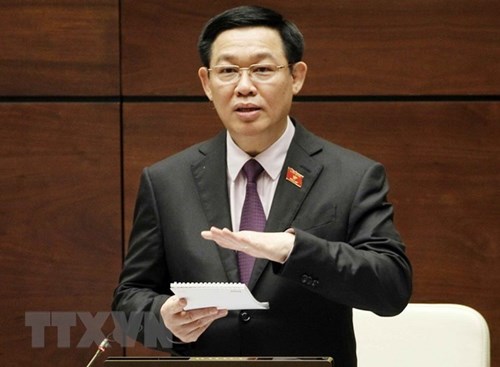About the circulation of fake and bad-quality medicines, Hue said their global rate nears 10 percent while the rate in Vietnam is about 2.1 percent.
In order to deal with the issue, the Prime Minister directed strengthening bidding in the Health Ministry, the Vietnam Social Security, hospitals and localities, which he said, will help reduce 15-20 percent of medicine prices.
The PM also requested pilot connecting medical stations with pharmacies to trace origin of medicines in the northern provinces of Vinh Phuc, Phu Tho and Hung Yen in early 2017, which will be reviewed in the middle of this year before launch nationwide.
    |
 |
|
Deputy Prime Minister Vuong Dinh Hue |
He also directed enhancing the fight against smuggling and trade fraud, including medicines.
The government and PM drastically asked for ensuring quality and reducing medicine prices, Hue said.
As regards the special administrative-economic zones in Van Don, Bac Van Phong and Phu Quoc, Hue said they aim to pilot mechanisms and create driving force for growth.
He affirmed that Hanoi and Ho Chi Minh City remain motive powers of the country while the seven key economic areas still must tap mechanisms and policies to uphold their strengths.
According to him, chairs of the special administrative-economic zones must be nominated by chairmen of the provinces, reviewed by the Ministry of Home Affairs, elected by the People’s Councils and approved by the PM.
Asked about the link between economic development in three special economic and administrative units and national defense-security stability and territorial integrity over time, NA Chairwoman Nguyen Thi Kim Ngan said the legislature is yet to approve the Law on Special Economic-Administrative Units so that the Deputy PM will give answers in writing.
On the management of virtual currencies, Hue stated that the State of Vietnam (SBV) issued a document refuting bitcoin and other virtual currencies as valid in Vietnam.
According to the Finance Ministry, up to 15,600 bitcoin mining machines have been imported to Vietnam since last year, nearly 9,000 of them are in Ho Chi Minh City, around 6,000 in Hanoi and the remaining in Da Nang.
He said the government has directed the Ministry of Justice, the SBV, ministries and agencies thoroughly consider worldwide management experience to issue proper policies.
Source: VNA